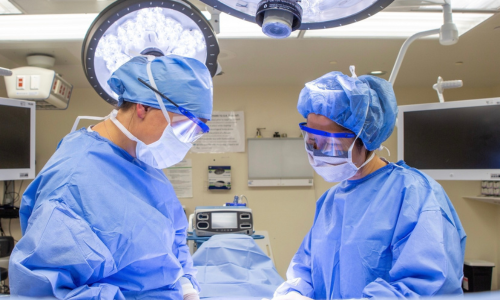Urogynecology
Emerson Health Urogynecology Services focus on the diagnosis and treatment of pelvic floor disorders in women, including urinary incontinence, pelvic organ prolapse, and other related conditions.

Overview
Our expert urogynecologist combines specialized knowledge in both urology and gynecology to provide personalized, compassionate care. Using advanced, minimally invasive techniques, we aim to restore comfort and improve quality of life, offering both surgical and non-surgical treatment options tailored to your needs. Whether you are dealing with a common issue or a more complex condition, we are here to support your pelvic health and well-being.
Conditions We Treat
Urogynecologists treat a variety of common pelvic floor disorders, such as:
- Urinary Incontinence: This includes issues like stress incontinence (leakage during coughing, sneezing, or physical activity), urge incontinence (leakage when there is a strong need to urinate), and overactive bladder (frequent or urgent urination).
- Pelvic Organ Prolapse (POP): POP occurs when one or more pelvic organs, like the bladder, uterus, rectum, or vagina, slip out of their normal position due to weakened pelvic floor support. This condition can also be linked to bladder problems.
- Fecal Incontinence: Weak pelvic floor muscles can result in difficulty controlling bowel movements, leading to unintended leakage of stool.
- Pelvic Floor Dysfunction: This condition involves difficulty coordinating the muscles responsible for controlling urination and bowel movements. It may cause issues with urination, bowel movements, vaginal pain, or discomfort during intercourse.
- Vaginal Fistulas: A vaginal fistula is an abnormal passage formed by an injury or underlying medical condition, allowing urine or stool to leak into the vagina.
Services
We offer a variety of treatments and guidance for pelvic floor conditions:
- Prescribe medications: These can include drugs to manage bladder control and maintain regular bowel movements.
- Fit for supportive devices: For conditions like POP, a urogynecologist may recommend a vaginal pessary. This is a device made from silicone, rubber, or plastic that is inserted into the vagina to provide support to pelvic organs.
- Perform surgeries: Surgical options include reconstructive procedures to reposition pelvic organs or surgeries to address bladder control issues. These may involve using the patient’s own tissue or supportive materials like mesh to strengthen weakened pelvic muscles.
- Teach pelvic floor exercises: Urogynecologists can guide patients through Kegel exercises to strengthen pelvic muscles. Additionally, they may collaborate with physical therapists using biofeedback, which helps patients learn to control their pelvic floor muscles.
- Recommend lifestyle changes: By assessing daily habits, urogynecologists can suggest modifications that may alleviate symptoms. This could include adjusting dietary habits, practicing relaxation techniques, or scheduling regular bathroom breaks to improve bladder control.
Urogynecology Specialist

Diego S. Illanes MD, FACOG, FACS
Gynecologic Surgery, Urogynecology Accepting new patients
Our Practice
-
Dr. Diego Illanes Urogynecology
131 Old Road to Nine Acre Corner
Concord, MA 01742



